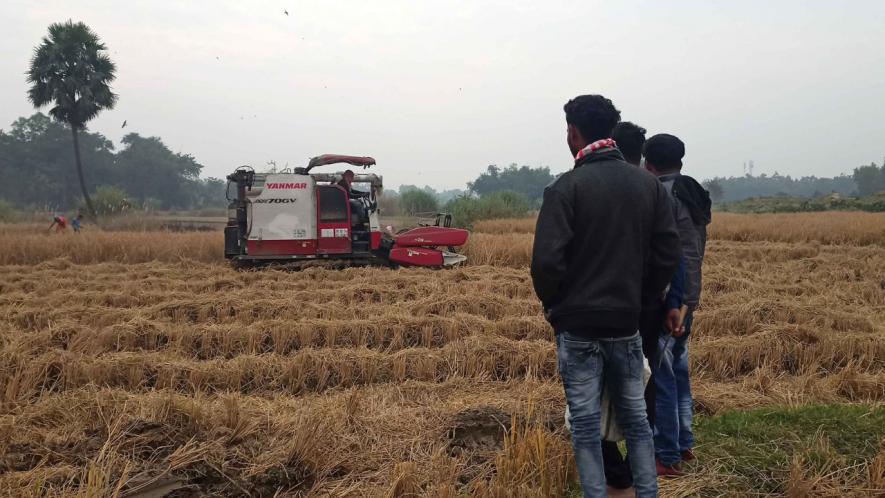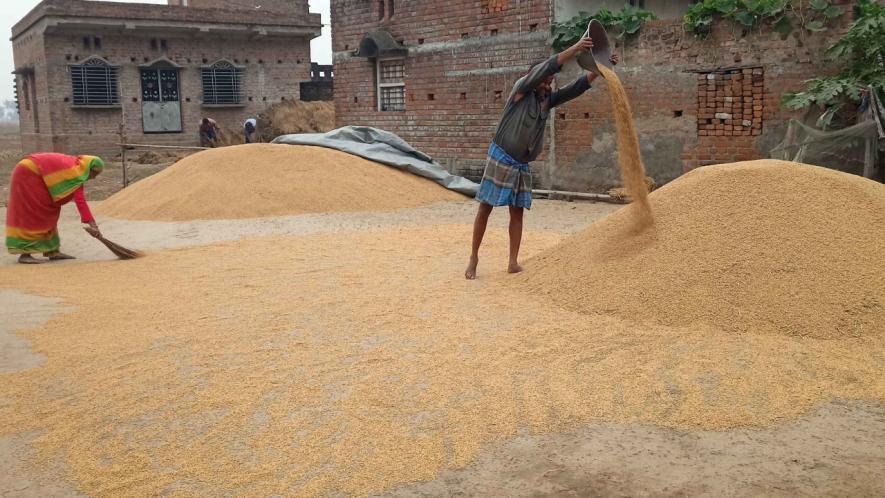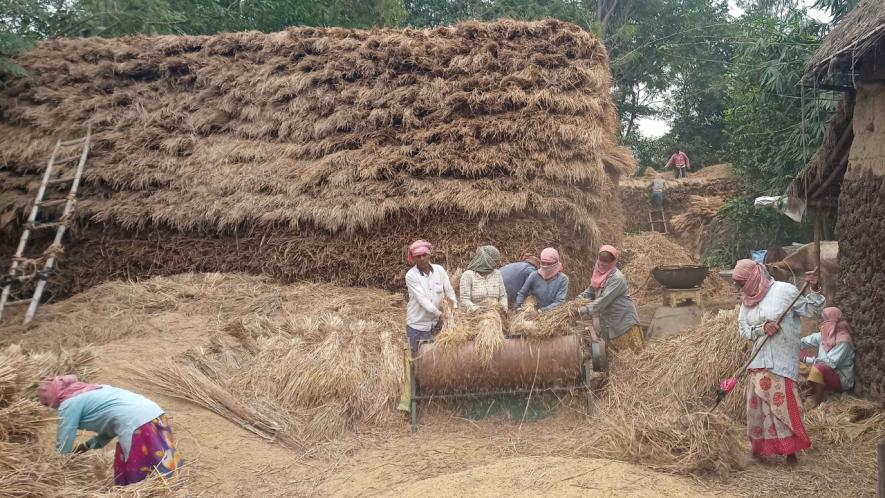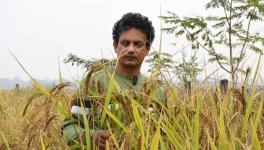Bengal: Paddy Farmers Being Forced to ‘Surrender’ to Middlemen in Bankura District

Harvesting machine cutting paddy at Kamargore village. | Images by Madhu Sudan Chatterjee
Amidst cloudy weather, Sirajul Mandal and his wife, Taslima, are drying paddy in the front yard of their house. Their daughter, Sania, a sixth-grade student, silently observes the golden paddy harvested by her father. She knows that within a day or two, this paddy will be delivered to the village aaratdar’s (middleman’s) shop.
Similarly, Asit Karak, another resident of this village in Bankura district, is packing paddy in several sacks to be delivered at the aaratdar’s house. This is mandatory for them, as these aaratdars help in running their family expenses throughout the year. So, these farmers have no right over this paddy.
Mandal and Asit are small farmers. Although there is a land deed in their name, the real owner of the land now is an aaratdar, whose directions these farmers have to follow.

Sirajul Mandal and his wife Taslima drying their paddy crops at Kamargore village.
Today, an independent farmer is forced to surrender completely before aartdars.
Such painful scenes were also seen in Kamargore village of Dhulai Gram Panchayat under Sonamukhi Block of Bankura District, Bengal, located 165 km away from Kolkata.
“The incident in Sonamukhi’s Kamargore village is not isolated. This scene can be seen in almost every district of Bengal. Despite the abnormal increase in prices of fertilisers and pesticides, farmers have to buy these at high rates in the black market due to lack of control and monitoring by the state government. On the other side, due to the non-availability of fair prices for the produced crops, and discrimination in purchase of paddy by government camps, the small and medium farmers in Bengal are facing the worst conditions,” Amal Haldar, state secretary of All India Kishan Sava (AIKS), told this reporter. He said this is why farmers were being forced to knock on the door of local middlemen to survive. They have no scope of bargaining for a better price.
The Condition of Farmers and Farm labourers
This year, about 80,000 hectares of Aaman paddy land in Bankura district remained uncultivated due to lack of adequate rains during the Kharif season and non-release of irrigation water from Kangsaboti and Damodar Valley Corporation (DVC) reservoirs at specific times.
The target was to cultivate 3,74,000 hectares. District Agriculture Officer Narayan Mandal told this reporter that 2,95,000 hectares had been cultivated for the Kharif season this year. However, several farmers said this was not true, claiming that the agricultural department had not done a proper survey, adding that block-level staff did not visit any field.

Farm labourers threshing paddy at Ruppal village.
“Many farmers’ seedlings withered and died. Despite spending a lot of money on loans, we could not save those saplings. We are in debt and the cultivated land is lying vacant across vast areas,” Asit Goswami, a farmer of Bhaktabandh village under Gangajalghati Block and Subash Niyogi of Kamalpur under Chhatna Block, said.
“While we were trying to save the paddy by buying water from local submersibles, we found that fertiliser was not available in the market. Black marketing had started. Now, we have to travel far in search of fertilisers, which are being sold at exorbitant prices. The cooperative society did not provide fertilisers to farmers at government rates. Actually, they did not take the initiative. So, we had to buy fertilisers in the black market,” said Subash Ghose of Kamargore village of Sonamukhi, Haidar Aali of Nabason village, Bamapada Saha of Dubrajpur under Simlapal Block, and numerous other farmers.
There are 290 agricultural cooperative societies in Bankura district, of which about 80 are not in working condition. Several other cooperatives are accused of huge corruption. The financial corruption of Rs 14 crore in Bankura District Central Cooperative Bank in 2014 has not been recovered till date. After the Trinamool Congress came to power in 2011, they took one after another cooperative by force, alleged the farmers.
Since 2011, there has been no election in even one cooperative in the district. Most cooperative societies have no specific plan to stand by farmers, a retired officer of Bankura District Central Cooperative Bank told this reporter.
Given this state of cooperatives, farmers are forced to depend on aaratdars and microfinance companies, several farmers, such as Rustom Mamtaz, Rupchand Ghose of Kamargore, Nimai Das and Asit Das of Pakhonna under Barjora Block, Laltu Majhi of Sarenga, said.
The farmers said microfinance companies have to pay loans that carry around 20% interest rate. On the other hand, farmers have to deliver their ‘gains’ to aaratdars. That’s the rule now, they said.
The farmers also alleged political discrimination in the indemnity insurance money, adding that several affected farmers had been deprived of Banglar Shosyo Bima Prokolpo (Bengal crop insurance scheme) introduced by the state government.
Jadunath Ray, AIKS Bankura district secretary, told this reporter that they had submitted specific information to the agriculture department, listing the actual number of affected farmers who had not received the insurance money. But there was no new investigation in this regard from the department, he added,
When asked, Narayan Mandla, the District Agriculture Officer, said compensation had been given to farmers of 47 gram panchayat areas who were affected by the Kharif season in the district this year. However, he did not say how many people received how much money. A former District Agriculture Officer told this reporter that this insurance scheme identified the crop damage to the panchayat area, not individual affected farmers. “That is the problem,” he added.
This year, the paddy crop also saw a lot of insects. “Pesticides given by aaratdars need to be sprayed in the fields because even if we produce that paddy with our hard work, the real owners are the aaratdars. After saving the paddy, a lot of ripened paddy was lost in the field due to untimely rains on November 8-9. We will not be able to repay the loan that we have taken from the aaratdars. Our debt will increase,” said Selim Khan, a small farmer of Khosbag village under Indas block.
Why Farmers Surrender to Aaratdars
About 300 families live in Khosbag village, where the land is of high-yielding quality. Cultivation here is done in three seasons - Kharif, Rabi, Boro. Farmers get irrigation water from the DVC reservoirs and also use water from submersibles. Most are small and medium farmers.
“During the Left Front period (before 2011), the cooperative society was most active. Loans were given to farmers before cultivation, fertiliser was given at a government fair rate. Cooperatives used to buy paddy from farmers. The aaratdars were there too, but we could negotiate with them on the sale of paddy. Besides, farmers could go to government camps to sell paddy. There was no political discrimination. But, now cooperative societies have almost stopped giving loans and stopped selling fertiliser,” Ranjit Lohar, Subash Ghose and Sirajul Mandal and Mantu Ghose told this reporter.
Several farmers of Kamargore village said that selling paddy to the government camp had created many complications. “Farmers have come back again and again not being able to sell paddy in government-organised camps. Paddy was being taken on the orders of the ruling party activists who surrounded the camps. Also, the price of paddy has been reduced by showing 7 kilograms less per quintal as bad paddy,” they said.
The farmers said they were disappointed with the government system because of which they were forced to “surrender to the aaratdars, who bought paddy at a low rate and started selling it in the government camp posing as farmers,” they said.
“Aaratdars give us fertiliser and pesticides. So, we are bound to buy their prescribed rate. Not only that, throughout the year, for all the expenses of our families, starting from education, medical treatment, social events, we have to borrow money from these aaratdars' ', they said.
Some farmers said that this year the middlemen were buying paddy at the rate of Rs1,600/quintal. Paddy crop was damaged due to untimely rains, which means out debts will not be paid,” they said.
“This time, paddy will be bought in 30 government camps in Bankura district. The purchase target has been set at 2,43,490 tonnes. The state government has announced a price of Rs 2,240 per quintal. In addition, the farmers will get a bonus of Rs 20 per quintal,” said Anbarul Khan, an officer of Bankura food and supply department.
Since last year, farmers have been getting an opportunity to apply for the sale of paddy in government camps online. In this context, Jadunath Ray said aaratdars had already sent the list online with names of several farmers under their control. As a result, many genuine farmers cannot sell the paddy in these camps. Also, this year, most places had not yet started buying paddy.
Aaratdars Adhir Ghose, Giyasuddin Mandal of Kamargore, Mathura Mandal at Manusmari village of Sonamukhi, Baidyanath Ghose of Pakhonna village of Barjora told this reporter that they were just doing business.
“Our family runs by buying and selling paddy. Farmers come to us, and we help them. We buy paddy at a low rate from those who borrow everything from us throughout the year and those who do not borrow, are paid Rs 50 more per quintal,” they said.
In this situation, farm labourers are in a more miserable condition than farmers. In most places, paddy is being harvested and threshed by harvesting machines. As a result, farm labourers are losing their livelihoods.
Sujoy Bauri, Shova, Konya, Jharna, Kajal Bauri of Kamargore village, who are all farm labourers, said they got threshing work for only four days. ‘We earned only Rs 800. How will we run our family with it? There is no MGNREGA work in the village. The panchayat is silent despite knowing everything,” they said.
Lakshman Bagdi of Ruppal, Sonamukhi, said, “I do not have any work, so I graze goats for Rs 50 a day.”
Village after village, youth have left to work as migrant labourers in other states. In a true sense, farmers and farm labourers are both facing a terrible time.
Sagar Badyakar, secretary, Khetmajur Union Bankura district, said the harvesting machines cannot be stopped. Hence, the government and panchayats have to give work to farm labourers. We have submitted a memorandum to various panchayats and blocks with this demand.”
The writer covers the Jangal Mahal region for ‘Ganashakti’ newspaper in West Bengal.
Get the latest reports & analysis with people's perspective on Protests, movements & deep analytical videos, discussions of the current affairs in your Telegram app. Subscribe to NewsClick's Telegram channel & get Real-Time updates on stories, as they get published on our website.
























